Average sizes and life expectancy for this breed:
The Cornish Rex are known to have an enthusiastic personality. They lovingly crave attention and are highly social as they like to partake in everything that happens in their household. This cat breed is also known as intelligent and active and they maintain their kitten-like playfulness well into their adulthood.
Loyal and affectionate, Cornish Rex are an excellent choice for families with children, other pets or a household with frequent guests. They will do everything to be in constant contact with their human companion.
The animated yet sophisticated Cornish Rex springs up into life and straight to your heart with fearless enthusiasm. They are athletic cats and have limitless love of jumping, playing and running. This cat is a natural breed originating from a mutation initially documented in England.
Frequently referred to as the Greyhound of the cat world due to their long-legged body with tuck-up, the Cornish Rex is easily recognizable by its wavy marcelled coat. Their curls go from their eyebrows to their whiskers and all over their body.
While there is no hypo-allergenic cat, the Cornish Rex is considered an excellent choice for people with cat allergies as they do not seem to exacerbate them as much as other cat breeds. Their large tall ears and soft, big oval eyes balance into their egg-shaped head, giving them a pleasingly expressive appearance.
The Cornish Rex prefers the company of their families, other cats, and other cat-friendly dogs rather than being left alone for long periods of time. Clever, friendly cats, they know their place, which is in the right in the middle of everything.
See available kittens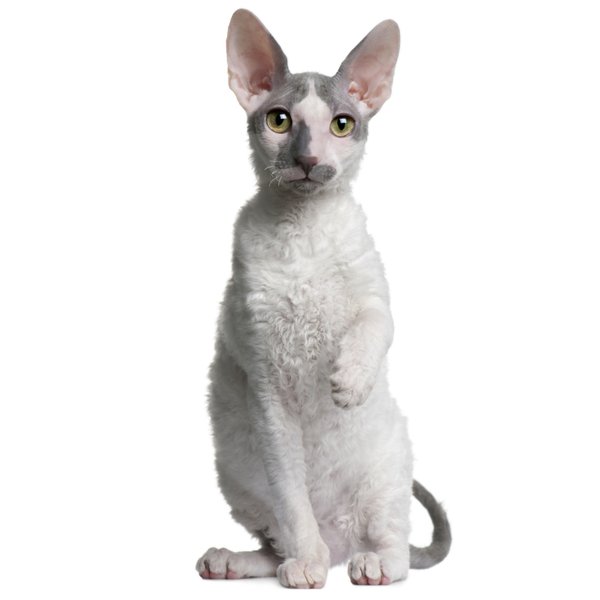

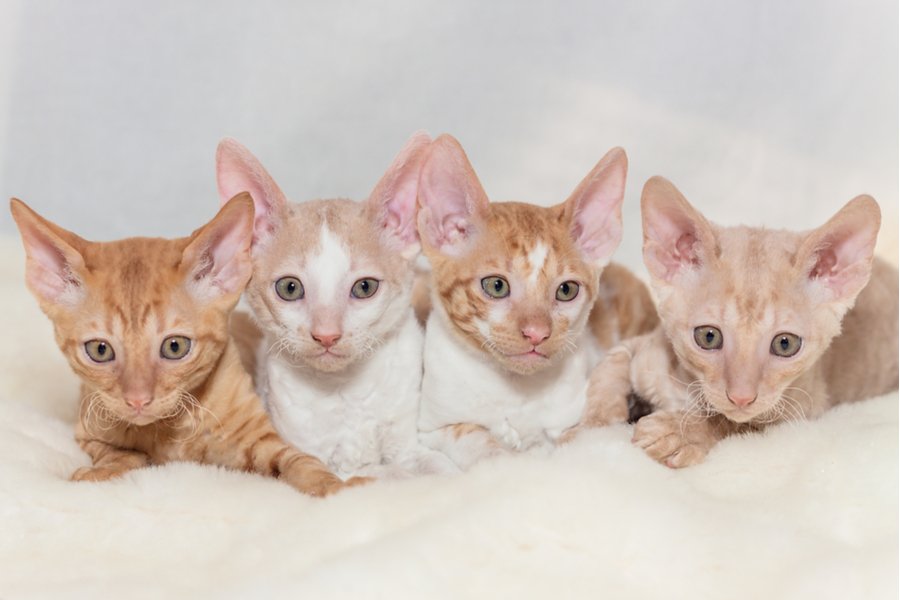


The story of the Cornish Rex starts in Bodmin Moor, Cornwall, United Kingdom. Owned by Mrs. Nina Ennismore, a tortoiseshell cat named Serena gave birth to a litter of five kittens on July 21, 1950. In this litter, a red & white coloured kitten had an uncommon curly coat. This kitten was named Kallibunker. Kalli became the founder of the Cornish Rex cat breed.
Mrs. Ennismore’s vet suggested that she contact the geneticist A.C. Jude. The vet also advised her to mate Kalli back to his mother. This breeding produced three kittens, one kitten was a straight coated female, and the other was two curly-coated males. Unfortunately, one of the two males died at seven months of age. The second male, named Poldhu, went on to produce further litters.
In the 1950s-1960s, the Cornish Rex were outcrossed with other domestic cats and Russian Blues, American Shorthair cats, Siamese, British Shorthairs and Havana Browns. This helped to produce great genetic diversity, additional coat colours and patterns, and a solid, healthy foundation for the cat breed.
In 1957, Frances Blancheri of California transported a Cornish Rex named Lamorna Cove to the United States. This cat was crossed with a Siamese, giving the breed their iconic long whippy tails and big ears and starting the Cornish Rex cat breed in North America.
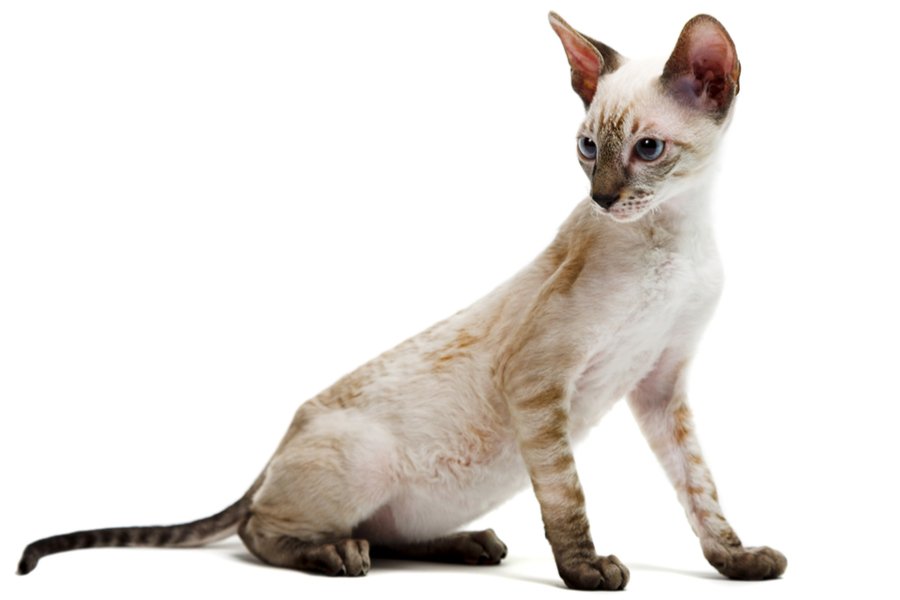
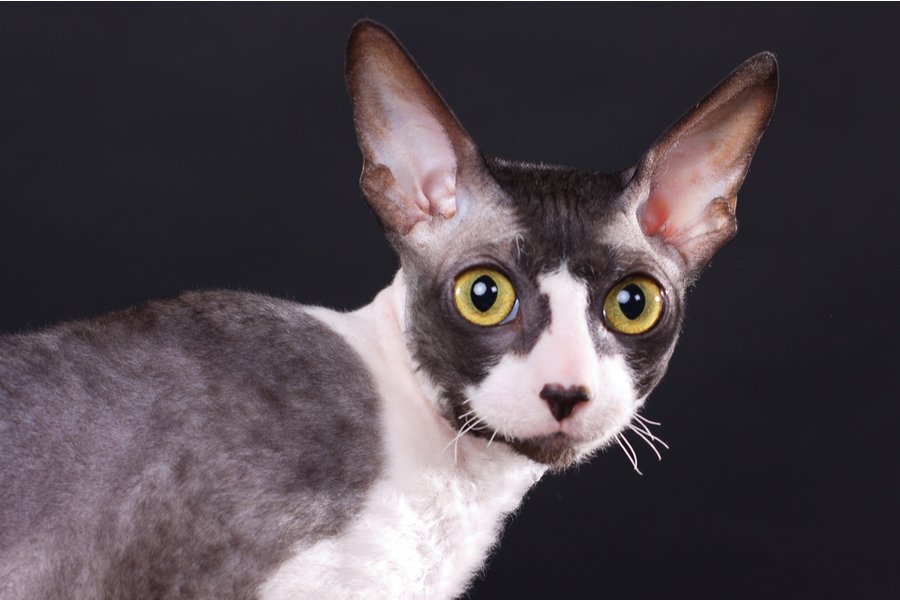
The Cornish Rex has a saucy slender body that stands tall on their legs. Do not be misled, though, while these beautiful cats appear fine-boned and sophisticated; they are really hard-bodied and muscular. They have a natural arch on their back which matches a tuck-up to their waist connecting to a long tapering tail.
Cornish Rex cats have refined oval paws and tend to walk high on their lithe toes. Their head is frequently said to look like an egg on its side with high cheekbones. They have tall ears which sit high on their head. Cornish Rex cats’ oval expressive eyes are slightly upward oblique and an aristocratic roman nose.
Cornish Rex’s most unique feature is their soft and distinct coat. Unlike most cats, Cornish Rex ‘coats do not have guard hairs, and their hair lays in Marcel waves that can be close-fitting or loose. They are frequently compared to a washboard in appearance and a Chenille when you touch its very soft and smooth texture. Their curls even extend to their whiskers.
This cat breed required little grooming. However, their ears and toes tend to be greasy. On average, female Cornish Rex weighs 2.27-3.18 kilograms while their male counterpart weighs 3.6-4.5 kilograms.
Cornish Rex comes in all colours and patterns from solid to tabbies to pointed, with or without white. Their muscular bodies frequently appear to be warm to touch because of their light coat. However, their lack of fur means they can get cold easily. Because of this, they love warm areas, be it a sunspot, heat vent, warm lap or under the sheets in bed.
While the breed’s coat is one of the most distinguishing traits, the Cornish Rex is also known for its recognizable egg-shaped head together with its high cheekbones, hollow cheeks, a fully bridged Roman nose, and their large ears set high on their head.
Their sturdy body has been compared to that of a Whippet because of their arched back, barrel chest, tiny waist, and very fine, long, strong legs. They use their well-developed hips and long legs for quick starts and stops, rapid turns, and high leaps.
The Cornish Rex has a beautiful eager personality. They are extremely social cats, not at all reserved. They are likely to be right in the middle of the action and love attention. They are extremely smart, very athletic & clownish. They retain their kitten-like personalities throughout their adulthood.
Cornish Rex is a very active, energetic and high-spirited cat breed that enjoys playing and will entertain themselves for long hours. Fetch is one of their favourite games, retrieving toys like their canine companions, and if no one is available to play with them, they will throw the toy for themselves with their paws like how we use our hands.
Cornish Rex cats adore attention and make an excellent feline companion. However, they can be needy and demanding at times. They do not like to be left alone for long hours, so it is a great idea for them to have another feline companion. They get along wonderfully with other animals.
The Cornish Rex is a perfect match for families with children because they are always ready to play. They are athletic and comical, but if there is no one available to play with them, they will invent animated and energetic games.
The Cornish Rex enjoys human interaction, attention and affection. Human contact is very vital for the Cornish Rex’s growth and welfare. So, if you are out for long periods of time during the day, it is recommended that you give your Cornish Rex a companion, either another cat or a dog, to keep them company for the rest of the day.
This loving cat breed is not a very vocal feline companion. Cornish Rex communicate their needs through their beautiful and expressive eyes and body language. Make sure to check on their cues if they need some love and attention.
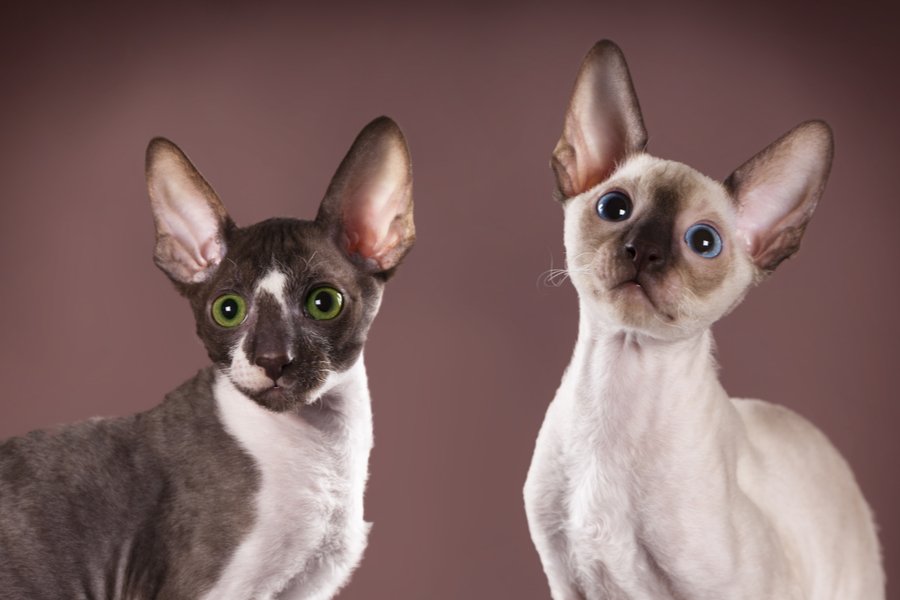
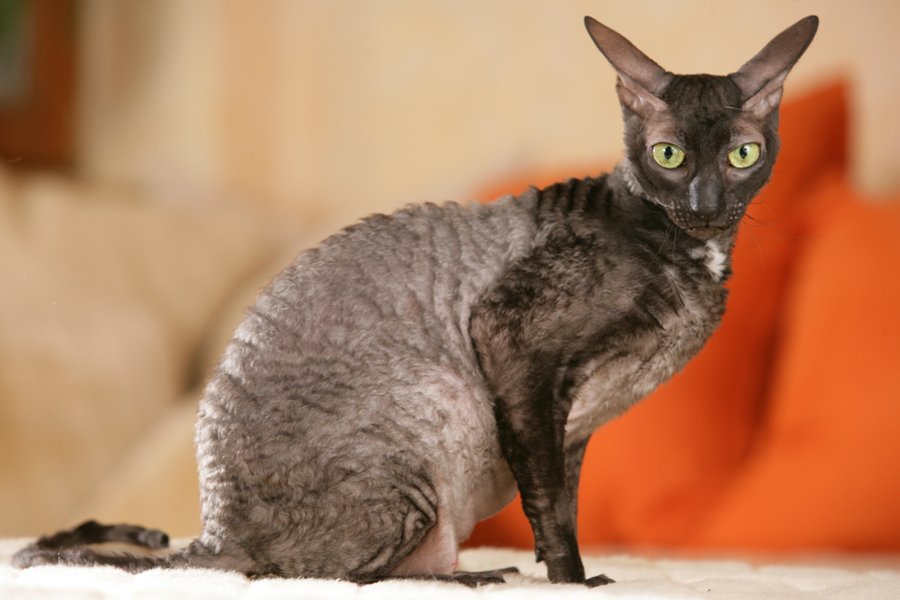
Due to their intelligence and curious nature, the Cornish Rex cat is easy to train. You can start them early by teaching them simple tasks like using the litter box and the scratching post. As they grow and mature, you can teach them more complex tricks, games and commands, such as playing fetch and retrieving games.
It is crucial for Cornish Rex to play interactive and puzzle toys to stimulate their bright minds continuously. Don’t forget to give them treats when they perform a trick, obey a command or just by simply behaving during training sessions. When a Cornish Rex cat is appropriately socialised and trained at an early stage, they will blossom into being a well-mannered and well-rounded family pet.
Grooming most Cornish Rex cats is as easy as brushing your hand over their coat. However, for Cornish Rex cats that have a longer or woollier coat, you may need to use a fine-tooth comb or soft bristle brush to keep their coat looking clean and neat. Groom them gently so you do not break their delicate hairs. One of the best things about their coat is that the hairs are so fine that they are not very visible on clothing and furniture.
Start by using a very soft brush to get your Cornish Rex used to being groomed. Remember, this cat breed has delicate hairs. So, a soft brush will help not pull their hair or hurt their young skin. Prepare a small reward like their favourite treat or kibble every grooming session to encourage your Cornish Rex to behave well while they are being groomed.
To keep their ears from infection, check them weekly for dirt or any buildup. Watch out for a foul odour, as it may be a sign of an ear infection. Clean their ears using a clean cotton ball or a soft cloth with a vet-approved ear cleanser. To effectively clean their ears, ask for tips from your vet.
For their dental health, weekly brushing is enough to keep your Cornish Rex’s teeth healthy and free from tooth and gum diseases. To keep their nails clean, trim them twice a month or when it is needed.
Just like their ears, it is important to regularly check their eyes to keep them clean and free from infection. You can use a clean, soft cloth to remove any eye discharge. Make sure to use a separate part of the cloth to avoid the spreading infection.
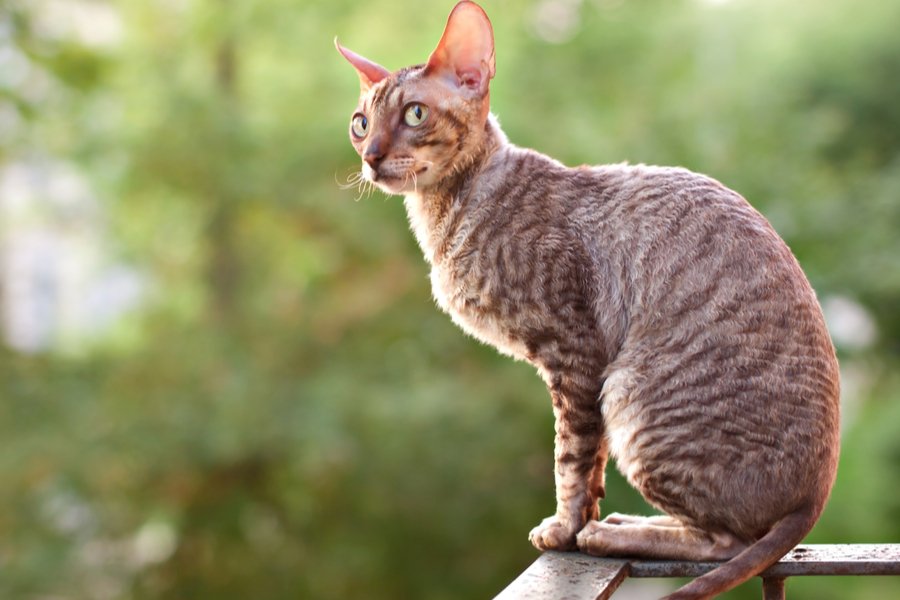
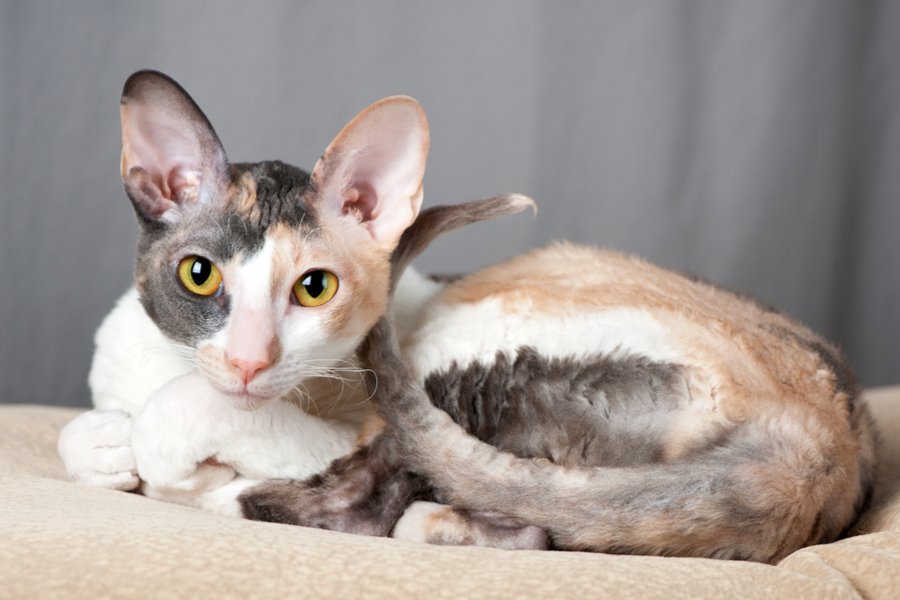
The Cornish Rex is generally a healthy cat breed. However, the following health conditions have been seen in the cat breed:
In addition, their lack of hair means oil collects on the skin, making it greasier. This can make their skin sensitive and itchy and cats with little or no hair can be prone to yeast infections.
Their life expectancy is between nine to thirteen years with proper care, exercise and provided with a high-quality diet. What’s more, to ensure they live a long and healthy life, we strongly recommend only buying a Cornish Rex from a reputable and registered breeder. This is because all good, ethical breeders run DNA health checks on their cats to ensure they are free from genetic conditions.
Cornish Rex are intelligent cats. They are very friendly and playful. That’s why many families with children choose to bring home one. While they are amicable, keep a watchful eye on your children when interacting with a Cornish Rex or any other cat breeds. This is to avoid any mishandling accidents that can result in skin scratching.
Living with other animals such as other cats and cat-friendly dogs is easy for a Cornish Rex. Due to their good-natured and friendly personality, this cat breed can live peacefully with other pets in the same household. But keep in mind that not all cat breeds are the same; always familiarise pets slowly and in controlled areas to ensure that they learn to get along well together.
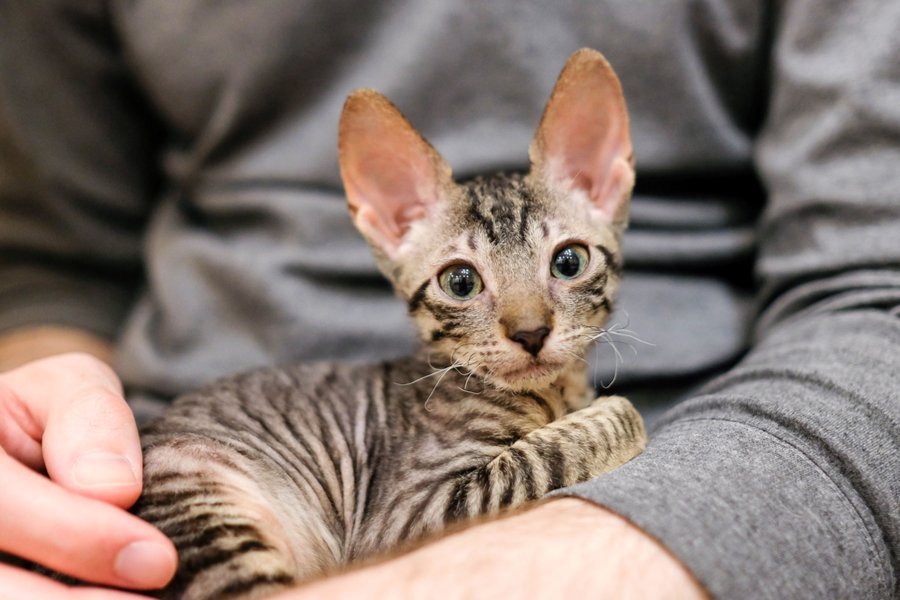
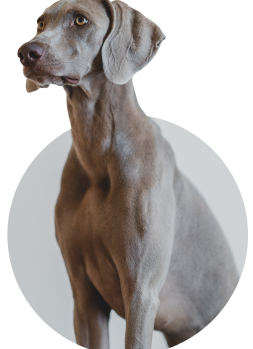
We can connect you with Breeders that are specialized in this particular breed.
See available kittens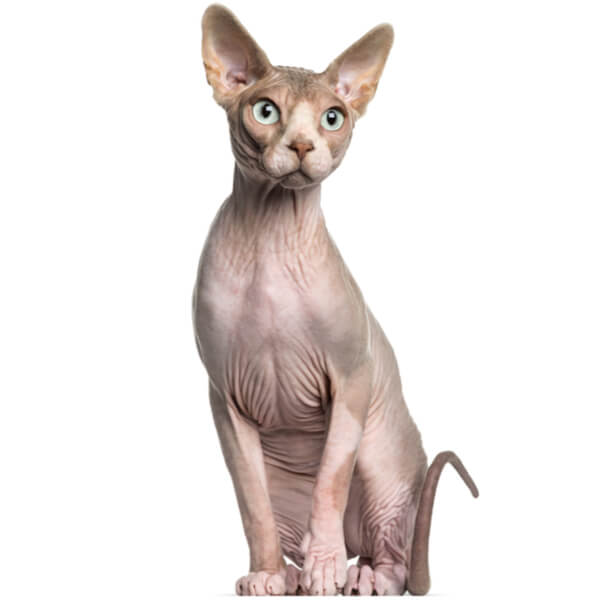
Canada
Size : Medium
Coat : Hairless
Registration : GCCF, TICA, CFA, FIFe
Vocality : High
Hypoallergenic : Yes
Grooming : Once a Week
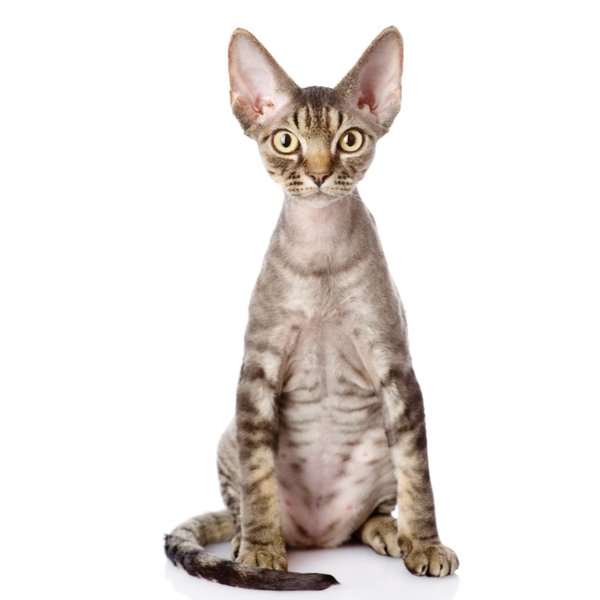
United Kingdom
Size : Small
Coat : Short
Registration : GCCF, TICA, CFA, FIFe
Vocality : Low
Hypoallergenic : Yes
Grooming : Once a Week
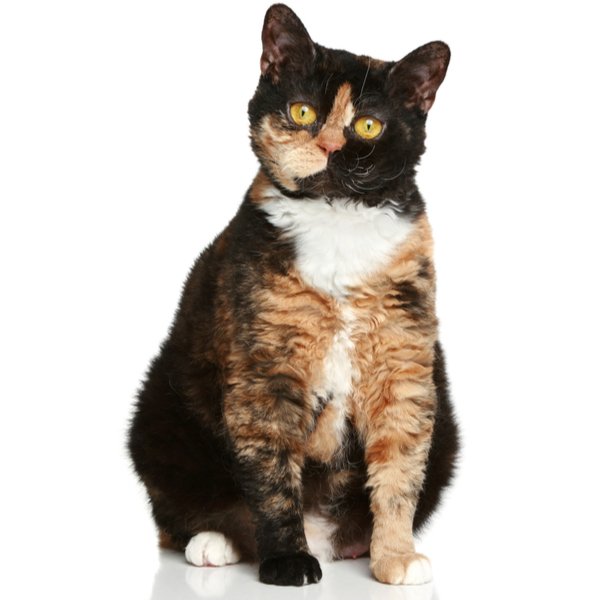
United States of America
Size : Medium
Coat : Short
Registration : GCCF, TICA, CFA, FIFe
Vocality : Low
Hypoallergenic : No
Grooming : Once a Week
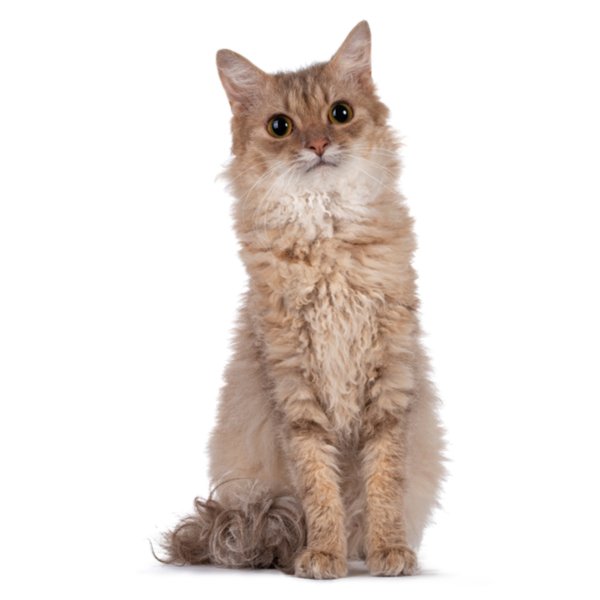
United States of America
Size : Small
Coat : Long
Registration : GCCF, TICA, CFA, FIFe
Vocality : Low
Hypoallergenic : Yes
Grooming : Twice a Week


Need some advice?
Whether you're a first time pet owner, an experienced pet owner, a new or long-time breeder, or just curious about pets, we've got you covered!
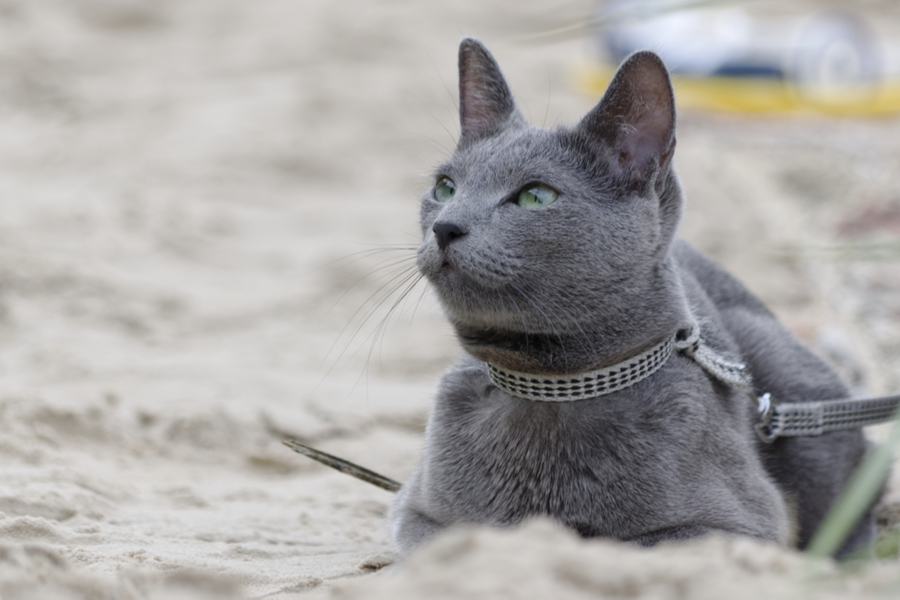
January 17, 2024
What Is The Personality Of Russian Blue Cats?
Russian Blue cats are most known for their distinctive shimmery blue-silver coat and piercing green eyes. However, this breed’s calm and gentle temperament is what makes them shine the most in the feline world.
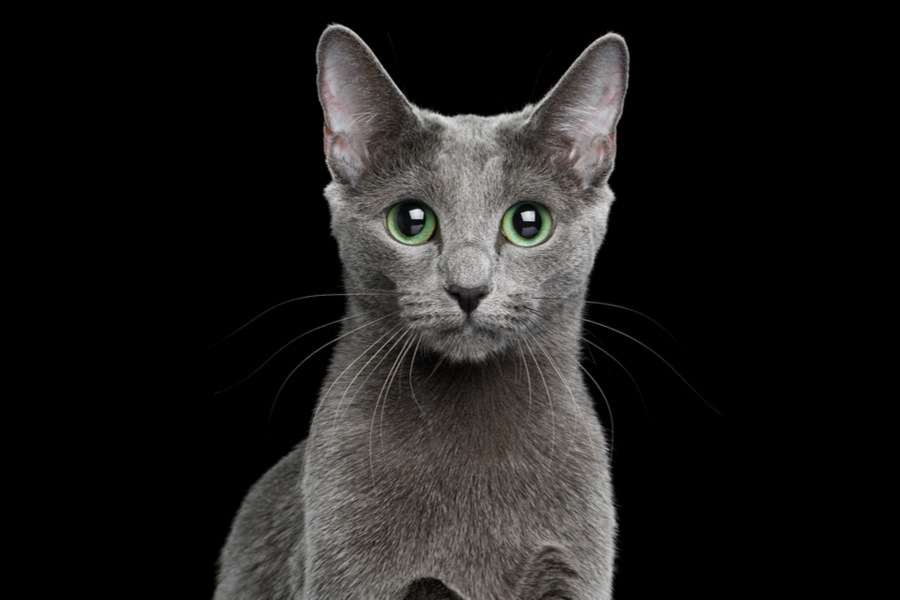
January 17, 2024
10 Facts About Russian Blue Cat Breed
Russian Blues are one of the most aesthetically stunning cat breeds, with a gorgeous plush silvery coat and vibrant green eyes. However, it’s not only their appearance that is beautiful; their nature is too.
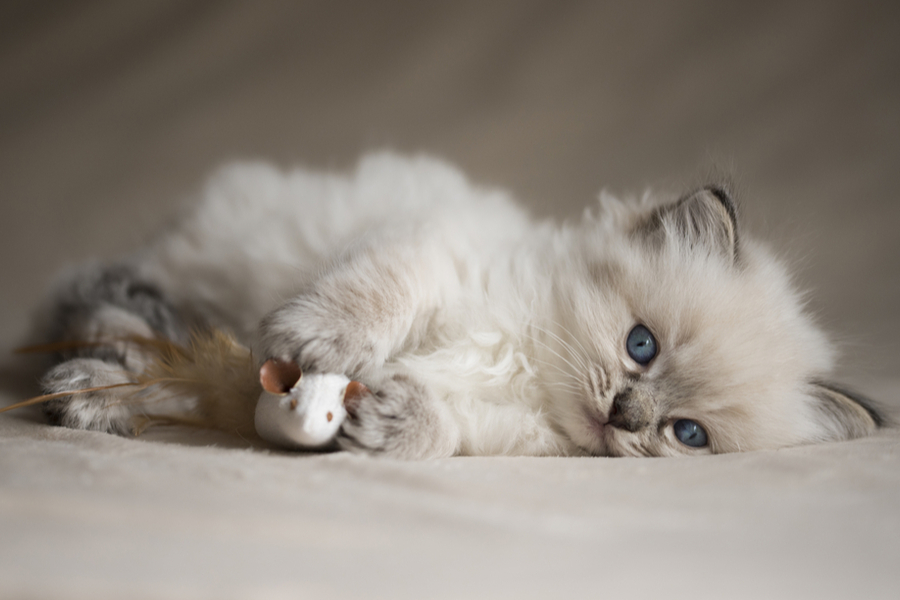
January 17, 2024
How To Choose The Right Cat Breed for You
Cats can make the most fantastic animal companions; they are adorable, friendly, and loving. However, not all felines are created equal. There are many different breeds, of which each has its unique personality traits.
Need some help?
Contact us to speak to our friendly advisor, who will gladly help you find your dream pet!



We are registered in England and Wales under registration number 12568840,
and our registered office is at 58-60 Kensington Church Street, W8 4DB London, England.
© 2023 The Pedigree Paws